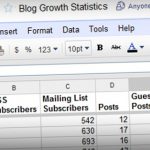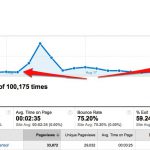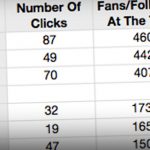
I know a lot of people are skeptical about blogging, especially business owners.
They want a website. They want to get traffic. And they want their website to be a lead generator rather than a cost center.
Yet, they don’t want to put effort into blogging and they don’t want to pay for traffic. Well, it’s one or the other.
Let me explain.
How Blogging Leads to Traffic
Your website will not get substantial traffic without a blog.
Want proof?
Name one website that you visited today that wasn’t different from the last time you visited it.
Facebook, Twitter, YouTube, and every news site on the planet gets tons of traffic because they’re constantly being updated with new content.
Content, after all, is the only reason somebody visits a website. I challenge you to think of any other.
Blogging and Search Engine Optimization
Let’s recap what we know about search engine optimization:
- Search engines like sites that are regularly updated.
- Search engines like sites that have quality content.
- Search engines like sites that have lots of content.
- Search engines like sites that have backlinks.
- Search engines like sites that have lots of social shares.
Now let’s see how blogging fits in:
- Blogging is the easiest way to regularly update your website.
- Blogging is the best way to showcase quality content.
- Blogging is the most practical way to post lots of content.
- Blogging is the most effective way to generate backlinks because people link to useful content.
- Blogging is the best way to accrue social shares because people share interesting content.
If you want free traffic from search engines, you need a blog.
Let’s look at two different websites.
One is your standard business website with the homepage, about page, contact page, services page, and maybe a few product pages.
The other has all of those pages plus 500 blog posts.
Which one do you think is going to get more search traffic?
Blogging and Social Media
Now, let’s take a look at the core of social media:
People post content to their walls and profiles that they believe their friends and followers will find interesting because they want to be perceived as interesting.
Blogging gives you a chance to be interesting.
Let’s look at those two examples again. Rarely will a stranger share a link that points back to a home page, about page, or product page. But, frequently, people share links with fascinating stories, creative videos, and interesting articles.
Once your blog starts getting search and social traffic, it’s time to start converting it.
How Blogging Leads to Lead Generation
By now you should be convinced that the most high-trafficked pages on your website will be blog posts. (If not, look at your Analytics.)
With that in mind, we need to work on converting those people. The conversion method of choice for most bloggers is an email opt-in.
Blogging and Email Marketing
Email opt-ins are often the goal because saying, “I want to receive emails from you” is the most engaged somebody could be prior to becoming a customer.
From a traditional marketing perspective, let’s look at why email works:
- Email is permission-based. People are more likely to consume your marketing message if they’re expecting and looking forward to receiving it.
- Email is targeted. The only people on your list will be people who have visited your website and liked it enough to sign-up for updates.
- Email is seen. Unlike most advertising, people will at least see, usually open, and ideally read every email you send them.
- Email is consistent. It follows the marketing principle that people need to see your marketing message seven times before they’ll purchase.
- Email builds trust. The longer people keep you in their inbox, the more they’re going to trust you.
I know there are lots of strategies and philosophies behind email marketing. One of the more popular strategies is to email out your blog posts. This does three things:
- Gives them free content so they’ll stay subscribed.
- Keeps you top of mind as long as you regularly update your blog.
- Provides a platform for your email subscribers to connect with you and other subscribers.
After all, the reason they signed up for your list is probably because they liked your blog. And if you don’t send them your blog posts, what are you going to send them? If they start getting too many pitches, they’re going to unsubscribe. So you need to send them valuable content. And if it’s valuable enough to put in an email, you might as well make it a blog post.
How Blogging Leads to Making Money
Since traffic generally starts on and subscribes through your blog, how does your blog lead to your business making money?
Let’s look at the big blogging picture:
- Blogging encourages Google to rank your site higher.
- Blogging enables people to spread the word about your company.
- Blogging persuades people to keep you in their inbox.
- Blogging helps you become a trusted authority.
The reason you opened the email or clicked the link that sent you here is because Michael has done a wonderful job of building this blog.
The alternative to getting traffic is buying ads that send people to boring sales pages where some will buy but most will leave, forever. It’s a lot less work, but a lot more expensive.
Even in Michael’s case. Let’s say he pays his authors $100 per blog post and the average IncomeDiary post is viewed 10,000 times over the life of the article. That may seem pricey, but to get the same amount of traffic through ads, he’d have to pay anywhere from $5,000-35,000. (The average cost-per-click with Google AdWords is between $0.50 and $3.50 depending on the keyword.)
You see? Blogging isn’t just part of your internet marketing strategy. It’s the core of it.
If your site is getting traffic and building trust, your business will make more money.
The only difference between Facebook/Twitter/YouTube and your blog is that they found a way to get people to update the content for them.
Have I convinced you?
I’m curious. If you’ve bought one of Michael’s products or purchased something he recommends as a result of finding his blog, let us know in the comments.
For me, I use Aweber because IncomeDiary originally introduced me to it.
Image by: cloud_nine











